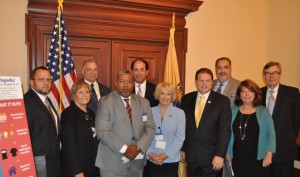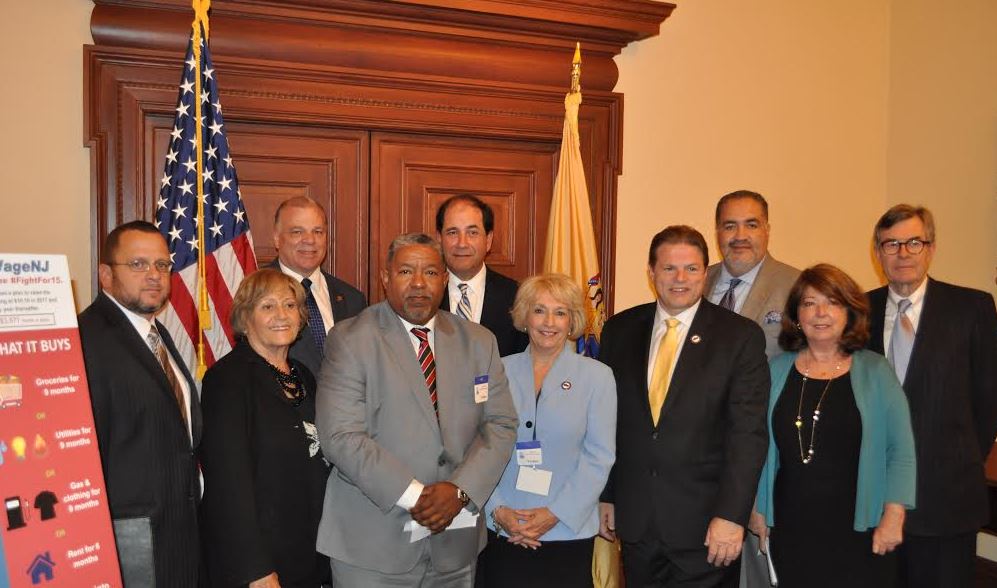 Fueling momentum to increase the minimum wage in New Jersey to $15, Democratic senators joined with workers’ rights groups, anti-poverty organizations and other advocates in support of a legislative plan approved by a Senate committee today that would boost hourly pay over five years and provide additional adjustments to keep pace with inflation.
Fueling momentum to increase the minimum wage in New Jersey to $15, Democratic senators joined with workers’ rights groups, anti-poverty organizations and other advocates in support of a legislative plan approved by a Senate committee today that would boost hourly pay over five years and provide additional adjustments to keep pace with inflation.
Senate President Steve Sweeney and Senator Joe Vitale, the chief sponsors of the bill, S-15, that was voted out of the Senate Labor Committee today 3 – 1, were joined by an array of organizations in a State House news conference where they pledged to get the legislation enacted or, if the governor refuses, to go to the voters with a constitutional amendment.
Joining in support were the AFL-CIO, the Anti-Poverty Network, the NAACP, the Latino Action Network, Citizen Action, the National Women’s Law Center, the Black Issues Convention, NJ Policy Perspective, the NJEA and the Center for Women & Work.
“This is a ‘Fight for 15’ that we will not allow to be defeated,” said Senator Sweeney, who authored the two previous minimum wage increases, including the successful effort that bypassed the governor with a public referendum. “Working people need and deserve to be paid a living wage for their labor. It is disgraceful that low-wage employees can work full-time jobs and still be living in poverty. The wealth gap that has widened is un-American and needs to be closed.”
A full-time, minimum-wage worker earns $335 a week, which totals more than $17,000 a year.
“The minimum wage should be a way for someone to work their way out of poverty, not to spend 40 hours each week at a job just to stay in poverty,” said Senator Vitale. “It’s shameful that one of the wealthiest states in the nation still relegates a portion of its workforce to below the poverty line. Our residents deserve better than minimum – they deserve a wage that can help them support their families.”
An estimated 1.1 million New Jerseyans – including 350,000 children – live in households that do not earn enough to meet basic needs, even with the help of government assistance programs, according to a study by Rutgers University economist William Rodgers.
“New Jersey’s growing poverty statistics are startling, and raising the minimum wage would be a strong first step toward addressing this problem,” says New Jersey State AFL-CIO President Charles Wowkanech. “The New Jersey State AFL-CIO and coalition partners consider raising the minimum wage and including a cost-of-living adjustment to be a top priority for low-income workers in this difficult economic climate.”
The legislation would increase the minimum wage to $10.10 on January 1, 2017. From January 1, 2018 until 2021, it would be increased annually by $1.25 per hour or $1 per hour, plus any increase in the Consumer Price Index. After 2021 the wage would be increased by any upward change in the CPI. If the federal minimum wage is raised higher than the state, then the state minimum wage would be set to the federal standard and increases to the CPI would be applied to the federal wage rate.
“As we stand here today, far too many New Jerseyans are working hard and not making enough to pay for the most basic necessities,” said Serena Rice of the Anti-Poverty Network. “They are the cashier who rang up your coffee this morning, the daycare teacher caring for my son, the janitor who keeps the restrooms clean for all of us. They are all an essential part of our community, and for our community to be strong they need a living wage.”
Once enacted, New Jersey would be the first state in the Northeast with a statewide minimum wage of $15. California recently enacted a $15 statewide minimum and New York put in place a similar requirement for New York City and its suburbs. Congressman Donald Norcross of New Jersey is proposing a $15 wage requirement nationally.
Opponents want to claim that the increase would cause job losses, repeating the same “false alarms” they tried to employ when the last increase was enacted and they said it would cost New Jersey 31,000 jobs, Senator Sweeney said. But in the two years that followed, New Jersey added 93,000 jobs, which the Governor has proudly cited as the best private sector job growth in the state in 15 years.
Boosting the wages of the working poor and middle income New Jerseyans benefits the economy as a whole, Senator Sweeney noted, referring to studies showing that the money gets spent in the local economy, increasing business profits and creating more jobs. According to a Federal Reserve study, every $1 increase in the minimum wage generates $1.35 in additional consumer spending.
A minimum wage worker would earn an additional $3,577 a year with the initial increase to $10.10, an amount that would grow to $13,469 when the $15 rate is reached.
(Attached photo: Christian Estevez, Latino Action Network; Phyllis Salowe-Kaye, NJ Citizen Action; Senator Sweeney; Charles Hall, Jr. NJ State AFL-CIO; Senator Vitale; Marie Blistan & Wendell Steinhauer, NJEA; Richard Smith, NAACP; Laurel Brennan, NJ State AFL-CIO; Gordon MacInnes, NJ Policy Perspective)
[TLS]


Once again the silly liberals are really nearsighted. What will happen is the big corporations will just cut back on workers in order to comply so good for the guys who avoid the pink slip but it will just add to the unemployment numbers by all the people that will be laid off or have their hours cut back as a result. Think about it yourself just a simple concept of supply and demand. What a coincidence that the most liberal local governments are the ones with this grand idea.